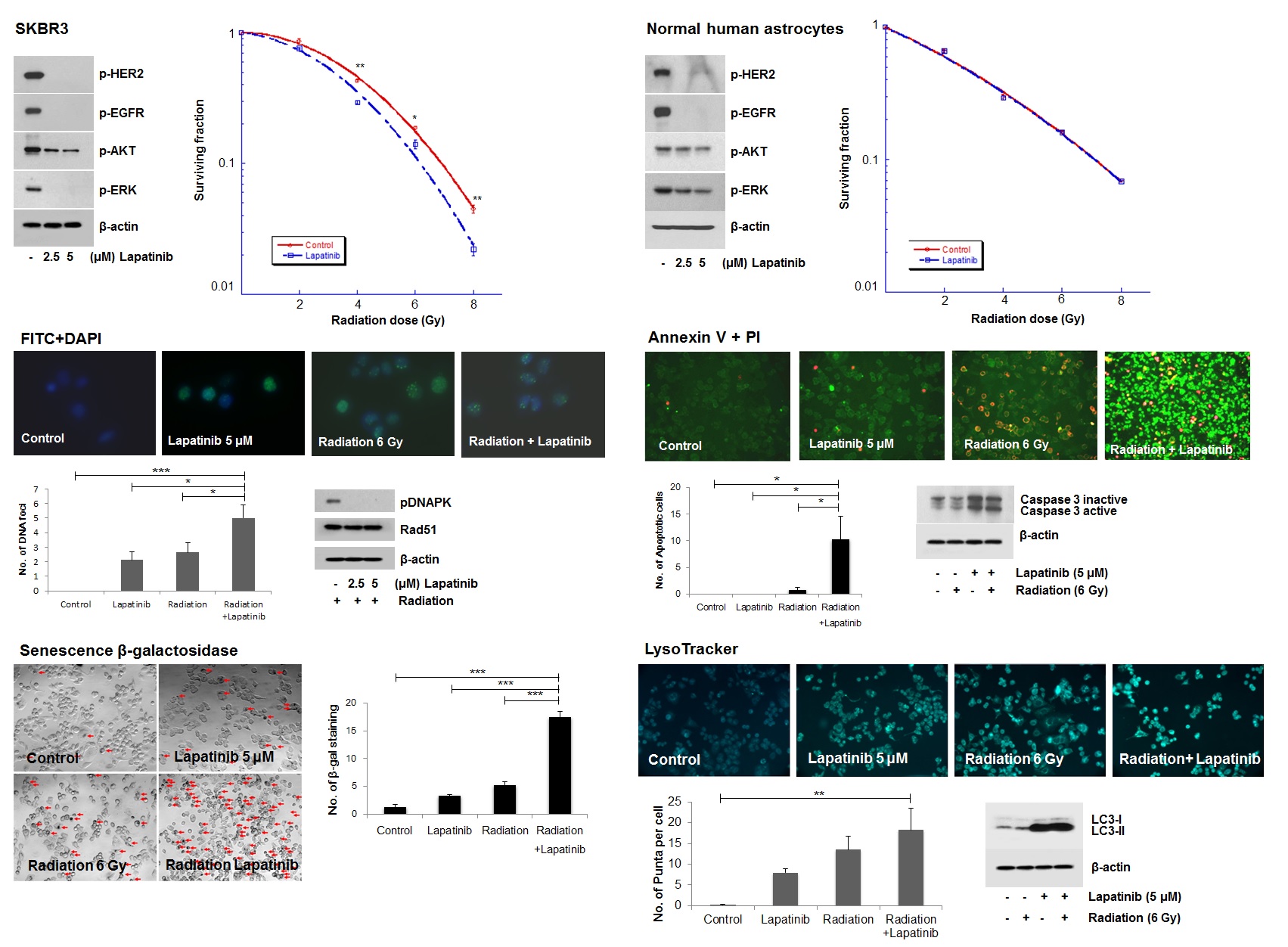글로벌 연구동향
방사선생물학
![[Oncotarget.] Radiosensitizing effect of lapatinib in human epidermal growth factor receptor 2-positive breast cancer cells.](/enewspaper/upimages/admin_20161115161051_R.jpg) 2016년 11월호
2016년 11월호
[Oncotarget.] Radiosensitizing effect of lapatinib in human epidermal growth factor receptor 2-positive breast cancer cells.서울의대/ 유도솔, 조봉준, 최은정, 김인아*
- 출처
- Oncotarget.
- 등재일
- 2016 Oct 12
- 저널이슈번호
- doi: 10.18632/oncotarget.12597. [Epub ahead of print]
- 내용

AbstractTrastuzumab has been widely used for the treatment of human epidermal growth factor receptor 2 (HER2)-overexpressing breast cancer, however, it cannot easily cross the blood-brain barrier (BBB) and is known to increase the incidence of brain metastases. In contrast, lapatinib has a low molecular weight and can cross the BBB and it could be useful to treat brain metastases in patients with HER2-positive breast cancer.To explore the impact of lapatinib on radiation response, we conducted an in vitro experiment using SKBR3 and BT474 breast carcinoma cells exhibiting HER2/neu amplification. Lapatinib down-regulated phosphorylated (p)-HER2, p-epidermal growth factor receptor, p-AKT, and p-extracellular signal-regulated kinase. Pretreatment of lapatinib increased the radiosensitivity of SKBR3 (sensitizer enhancement ratio [SER]: 1.21 at a surviving fraction of 0.5) and BT474 (SER: 1.26 at a surviving fraction of 0.5) cells and hindered the repair of DNA damage, as suggested by the prolongation of radiation-induced γH2AX foci and the down-regulation of phosphorylated DNA-dependent protein kinase, catalytic subunit (p-DNAPKcs). Increases in radiation-induced apoptosis and senescence were suggested to be the major modes of cell death induced by the combination of lapatinib and radiation. Furthermore, lapatinib did not radiosensitize a HER2- negative breast cancer cell line or normal human astrocytes.These findings suggest that lapatinib can potentiate radiation-induced cell death in HER2-overexpressing breast cancer cells and may increase the efficacy of radiotherapy. A phase II clinical trial using lapatinib concurrently with whole-brain radiation therapy (WBRT) is currently being conducted.
Author information
Yu T1, Cho BJ2, Choi EJ1, Park JM1,2, Kim DH2, Kim IA1,2,3,4,5.
1Department of Radiation Oncology, Graduate School of Medicine, Seoul National University, Seoul, Republic of Korea.
2Medical Science Research Institute, Seoul National University Bundang Hospital, Seongnam, Seoul, Republic of Korea.
3Department of Radiation Oncology, Seoul National University College of Medicine, Seoul, Republic of Korea.
4Cancer Research Institute, Seoul National University College of Medicine, Seoul, Republic of Korea.
5Institute of Radiation Medicine, Seoul National University College of Medicine, Seoul, Republic of Korea.
- 키워드
- breast cancer; human epidermal growth factor receptor 2; lapatinib; radiotherapy
- 연구소개
- HER2 양성 유방암세포에서 lapatinib의 기존에 HER2 양성 유방암에서 사용하던 표적치료제인 trastuzumab 은 HER2 양성유방암환자의 생존율을 획기적으로 증가시켜온 반면 분자량이 커서 혈액뇌장벽을 잘 통과하지 못해 장기생존환자의 뇌전이 발생이 중요한 임상적 이슈로 대두되었습니다. 본 연구는 혈액뇌장벽을 통과할 수 있는 lapatinib라는 small molecule HER2 표적치료제의 방사선감작효과 및 그 기전을 소개한 논문입니다. HER2양성 유방암세포에서 Lapatinib은 방사선 감작효과를 효과적으로 증가시킨 반면 정상 뇌세포에서는 이러한 효과가 관찰되지 않았습니다. 상호작용의 기전으로 lapatinib이 NHEJ에 관여하는 p-DNAPKcs의 조절을 통해 방사선에 의한 DNA 손상의 복구를 지연시킴을 알 수 있었습니다. lapatinib과 방사선의 조합에 의한 세포사는 주로 세포자멸과 세포노화로 밝혀졌습니다. 본 연구결과를 바탕으로 현재 HER2 양성 유방암 뇌전이 환자를 대상으로 방사선치료 및 lapatinib을 병합요법에 대한 제2상 무작위 임상시험(NCT01622868)이 미국 RTOG (Radiation Therapy Oncology Group) 및 KROG (Korean Radiation Oncology Group)의 공동연구로 진행되고 있으며, 향후 난치성 HER2양성 뇌전이 환자의 치료성적 향상에 기여할 수 있을 것으로 기대합니다.
- 덧글달기
- 이전글 [Cytotherapy.] Irradiation of breast cancer cells enhances CXCL16 ligand expression and induces the migration of natural killer cells expressing the CXCR6 receptor.
- 다음글 [Carcinogenesis. ] Silencing of ST6Gal I enhances colorectal cancer metastasis by down-regulating KAI1 via exosome-mediated exportation and thereby rescues integrin signaling.







